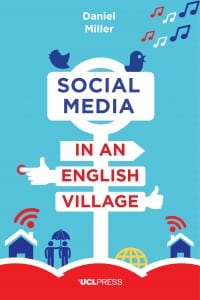‘We needed a Press with vision and ambition’
By Daniel Miller, on 14 June 2016
 For our particular project, Why We Post, the creation of UCL Press was simply the perfect answer to a key question. We had already committed to open access. This is something I am personally very committed to and had previously published a paper advocating open access in an anthropology journal. I was very disappointed with the current models of Green and Gold and wanted what I think of as genuine open access, which inevitably means publication being taken back into the university system and thereby saving huge sums for libraries. I feel this strongly as anthropologist since we need to make our findings accessible to low-income people in low-income countries which are the populations that we typically study.
For our particular project, Why We Post, the creation of UCL Press was simply the perfect answer to a key question. We had already committed to open access. This is something I am personally very committed to and had previously published a paper advocating open access in an anthropology journal. I was very disappointed with the current models of Green and Gold and wanted what I think of as genuine open access, which inevitably means publication being taken back into the university system and thereby saving huge sums for libraries. I feel this strongly as anthropologist since we need to make our findings accessible to low-income people in low-income countries which are the populations that we typically study.
The additional headache was that we were committed to publishing 11 books. Having carried out nine different 15-month ethnographies we knew we had a vast amount of important new material about the use and consequences of social media, a topic of huge public interest. For us open access also means writing in an open and accessible style. But taking on 11 volumes is quite a commitment. So we needed a press with vision and ambition.
At this point we could not be happier with the result. We launched the first three books at the end of February and within a month we had over 10,000 downloads, which is almost unimaginable in traditional publishing. As people who work on digital technologies it’s great to see online books with hyperlinked chapters and endnotes that we can link to directly from our free FutureLearn e-learning course and our Why We Post website. In addition, a topic such as social media is about the rise of visual communication and it was essential for us to have many colour images included.
FutureLearn e-learning course and our Why We Post website. In addition, a topic such as social media is about the rise of visual communication and it was essential for us to have many colour images included.
We feel we have been supported throughout this adventure by UCL Press, especially with regard to advertising and marketing. I have published 37 volumes and was particularly impressed by the fast turnaround from submission of final manuscripts. We are happy that there are also relatively inexpensive offline paperbacks for those who prefer physical books. But if I was to pick out one particular achievement which matters to an anthropologist it is that our books are being read in 132 countries with over 100 downloads recorded for countries as diverse as Turkey, Russia, Poland, Japan and Mexico.
About the author
Daniel Miller is Professor of Anthropology at UCL and author of 37 books including Social Media in an English Village, The Comfort of Things, Stuff, Tales from Facebook and A Theory of Shopping. Find out more about the Why We Post series at https://www.ucl.ac.uk/ucl-press/why-we-post.
 Close
Close

